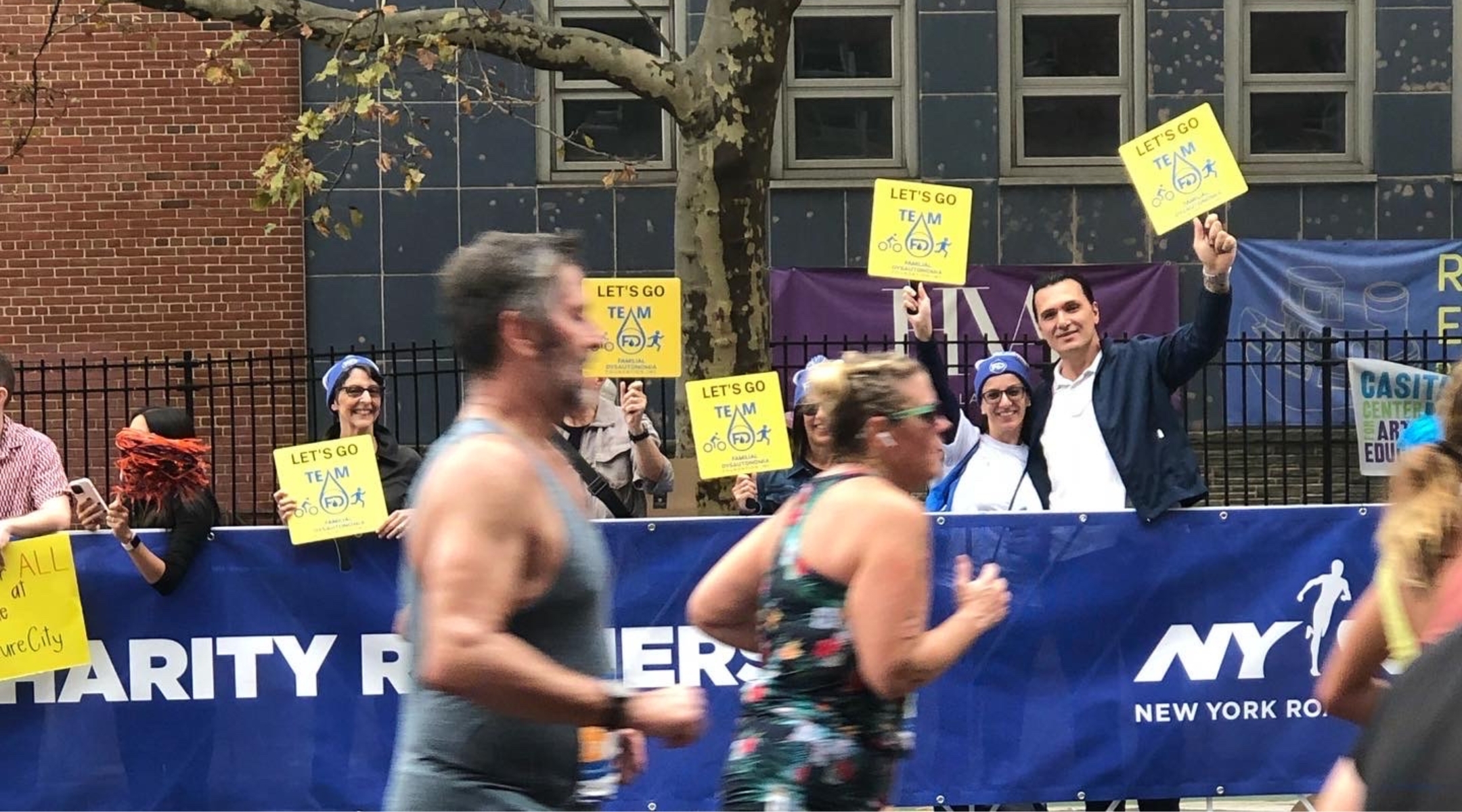As a 40th birthday gift to himself, Rabbi Joshua Franklin is running his first-ever marathon in New York City on Sunday. The head of the Jewish Center of the Hamptons will be running on behalf of the Familial Dysautonomia Foundation.
During the race, he’ll be thinking about Samantha Ginsburg, an activist for the rare Jewish genetic disorder, who died of related cardiac complications in 2022.
Franklin had initially set out to raise $3,600 for the foundation — a number connected to the Jewish tradition of giving in multiples of $18 — but has now raised nearly $6,000. He hopes to raise even more in a last-minute push ahead of the world’s largest marathon, where more than 50,000 runners from around the world assemble to run a 26.2-mile course that traverses all five boroughs of New York City.
The rabbi is one of many marathon participants who are running to fundraise for Jewish organizations or support a Jewish cause.
Some runners are using the race to call attention to the hostages still held captive in Gaza, a cause that two dozen runners took up during last year’s marathon, which was held less than a month after Hamas took more than 250 captives in its Oct. 7 attack on Israel.
This year, more than 150 people have registered to run with the Hostages and Missing Families Forum in honor of five hostages who are known to be avid runners — Doron Steinbrecher, Naama Levy, Ohad Yahalomi, Evyatar David and Edan Alexander. Each runner will wear a shirts with the name of a hostage and carry Israeli flags with a yellow ribbon.
The marathon is also altering plans for the hostage advocacy group, which over the last year has held demonstrations in front of the United Nations, vigils at public parks, met with Israeli and American politicians and celebrities, and advocated for hostage release and a ceasefire deal.
Local supporters have also marched in Central Park nearly every Sunday to call attention to the hostages. But this year, parts of the park will be closed on Sunday because of the race — so instead, the group will assemble at Columbus Circle, near the finish line, to support its affiliated runners.
More than 250 Israelis will be running the marathon to support Shalva, an organization that supports Israelis with disabilities. A pre-marathon solidarity run on Friday morning included members of the social club Nice Jewish Runners as well as members of the Shalva delegation. Several people with ties to Oct. 7 and its aftermath, such as a man who survived the attack while on his morning run, are part of the delegation, Shalva revealed this week.
Official partners of the marathon include various hospitals and foundations for diseases that affect Jews, like Sharsheret (breast cancer), the Cystic Fibrosis Foundation, as well as the Marlene Meyerson JCC; the Friendship Circle, which brings together children of different abilities; Ohel Children’s Home, which provides emotional and social services for children; and Chai Lifeline, helps families with children dealing with serious illnesses.
For Franklin, running the marathon is both a personal and communal contribution. As a rabbi, he counsels engaged and married couples on getting screened for genetic diseases that affect Jewish populations.
“This is a real thing among Jews, and it affected my family as well,” Franklin said of familial dysautonomia, a rare inherited condition that affects the nervous system. “My brother and his wife both tested positive for a similar Jewish genetic disease and had trouble conceiving because of that.”
He said he was looking forward to running alongside thousands of others raising money for one important cause or other. “One of the beautiful things about the day is that the majority of people are running for a charity, and this is a great triumph for the spirit of humanity, where we show that it’s not just about runners,” he said. “It’s about contributing to the greater good of society. It’s about healing the world one donation at a time, and recognizing that there’s enormous fractures in our communities and in the world, and through events like this, we can take part in slowly mending each broken piece one at a time.”
The New York Jewish Week brings you the stories behind the headlines, keeping you connected to Jewish life in New York. Help sustain the reporting you trust by donating today.





